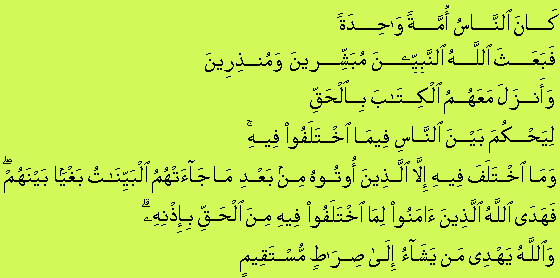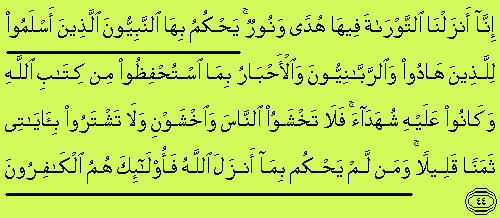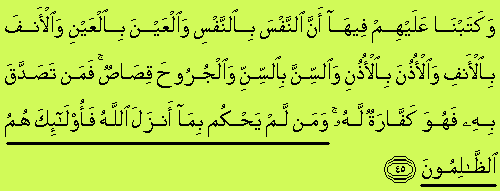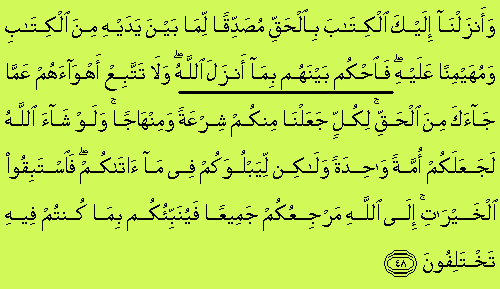The second portion of the command in "Obey Allaah and obey
the messenger" is a very widely misused portion of the Qur-aan.
All sorts of things have been introduced into the religion, in the name
of our prophet, by first misusing the name of some persons who lived in
a period much later after our prophet (peace upon him). Those persons are
described as very sincere, honest and religious persons. (Let us not dispute
about them; may be they were really good). Then it is said that the persons
spent long years diligently collecting and verifying the sayings of our
prophet. Let us accept they made collections of the true sayings of our
prophet. Then what is the guarantee that their collections were not tampered
with or substitued by other persons, in a later period? On whose guarantee
should we believe that these ahaadeeth books have remained uncorrupted?
We have already studied some verses in the previous chapters which outline
the principle of judging the sayings attributed to the prophet (peace upon
him). In this chapter, we would study details about the command "
obey the messenger ".
First of all, we would be required to obey the messenger only
if he commands. There is no question of obeying him unless he commands.
Let us see what directions Allaah has given to our prophet and all other
prophets and messengers (peace upon all of them), about commanding (to)
the people. We would find from the following verses that all the prophets
have been directed to command the people with (meaning using) that
which has been sent down / revealed to them by Allaah.

 "Mankind was one single nation,
and Allaah sent prophets as givers of glad tidings and warners;
and with them He sent the Book in truth,
to judge between people in matters
wherein they differed;
and those who were given the Book, after the Clear Signs came to
them, did not differ among themselves, except through selfish contumacy.
And Allaah guided the Believers to the Truth, concerning that wherein
they differed (away) from the truth, by His Leave;
For Allaah guides whom He will to the straight path. " (2:213
)
"Mankind was one single nation,
and Allaah sent prophets as givers of glad tidings and warners;
and with them He sent the Book in truth,
to judge between people in matters
wherein they differed;
and those who were given the Book, after the Clear Signs came to
them, did not differ among themselves, except through selfish contumacy.
And Allaah guided the Believers to the Truth, concerning that wherein
they differed (away) from the truth, by His Leave;
For Allaah guides whom He will to the straight path. " (2:213
)
 "Have you not seen those who have been given a portion of the
Book? ; they are invited to the Book of Allaah, that it may judge between
them, then a faction of them turn away, and decline." (3:23)
"Have you not seen those who have been given a portion of the
Book? ; they are invited to the Book of Allaah, that it may judge between
them, then a faction of them turn away, and decline." (3:23)
 "Indeed We have sent down unto you the Book with the truth,
so that you may judge between mankind by that which Allaah has shown you
: so be not a pleader for the treacherous. " (4:105)
"Indeed We have sent down unto you the Book with the truth,
so that you may judge between mankind by that which Allaah has shown you
: so be not a pleader for the treacherous. " (4:105)
 " Indeed We revealed the Torah, wherein is guidance and a light,
by which the prophets who surrendered (unto Allaah) judged the Jews,
and the rabbis and the priests, for to them was entrusted the protection
of Allaah's Book, and they were witnesses thereto. So fear not mankind,
but fear Me. And barter not My revelations for a little gain. Whoso
judges not by that which Allaah has revealed: such are disbelievers."
(5:44)
" Indeed We revealed the Torah, wherein is guidance and a light,
by which the prophets who surrendered (unto Allaah) judged the Jews,
and the rabbis and the priests, for to them was entrusted the protection
of Allaah's Book, and they were witnesses thereto. So fear not mankind,
but fear Me. And barter not My revelations for a little gain. Whoso
judges not by that which Allaah has revealed: such are disbelievers."
(5:44)
 "We ordained therein for them: 'Life for life, eye for eye,
nose for nose, ear for ear, tooth for tooth, and wounds equal for equal.'
But if anyone remits the retaliation (by way of charity), it is an act
of atonement for him. Whoso judges not by that which Allah has revealed,
such are wrong-doers." (5:45)
"We ordained therein for them: 'Life for life, eye for eye,
nose for nose, ear for ear, tooth for tooth, and wounds equal for equal.'
But if anyone remits the retaliation (by way of charity), it is an act
of atonement for him. Whoso judges not by that which Allah has revealed,
such are wrong-doers." (5:45)
 " Let the People of the Gospel judge by that which Allaah
has revealed therein. Whoso judges not by that which Allaah has revealed:
such are evil-livers." (5:47)
" Let the People of the Gospel judge by that which Allaah
has revealed therein. Whoso judges not by that which Allaah has revealed:
such are evil-livers." (5:47)
 " And unto you have We revealed the Scripture with the truth,
confirming the Scripture that was before it, and a watcher over it. So
judge between them by that which Allaah has revealed, and follow not
their desires away from the truth which has come unto you. For each We
have appointed a divine law and an open way. Had Allaah willed He could
have made you one community; But that He may try you by that which He has
given you. So compete one with another in good works. Unto Allaah you will
all return, and He will then inform you of that wherein you differ."
5:48
" And unto you have We revealed the Scripture with the truth,
confirming the Scripture that was before it, and a watcher over it. So
judge between them by that which Allaah has revealed, and follow not
their desires away from the truth which has come unto you. For each We
have appointed a divine law and an open way. Had Allaah willed He could
have made you one community; But that He may try you by that which He has
given you. So compete one with another in good works. Unto Allaah you will
all return, and He will then inform you of that wherein you differ."
5:48
 " So judge between them by that which Allaah has revealed,
and follow not their desires, but beware of them lest they seduce you
(away) from some part of that which Allaah has revealed unto you. And if
they turn away, then know that Allaah's Will is to smite them for some
sin of theirs. And indeed many of mankind are evil-livers. " (5:49)
" So judge between them by that which Allaah has revealed,
and follow not their desires, but beware of them lest they seduce you
(away) from some part of that which Allaah has revealed unto you. And if
they turn away, then know that Allaah's Will is to smite them for some
sin of theirs. And indeed many of mankind are evil-livers. " (5:49)
 "Do they then seek after a judgment of (the Days of) Ignorance?
and Who is better than Allaah for judgment, for a people who have certainty
(in their belief)?" (5:50)
"Do they then seek after a judgment of (the Days of) Ignorance?
and Who is better than Allaah for judgment, for a people who have certainty
(in their belief)?" (5:50)
So, the messenger is going to command with, i.e., using what Allaah
sent down and we are told to obey him.
In the following verse, Allaah asks us to obey Allaah, and obey the
messenger and those in authority among us.

"O you who believe! Obey Allaah, and obey the messenger and
those of you who are in authority; and if you have a dispute concerning
any matter, refer it to Allaah and the messenger, if you are (in truth)
believers in Allaah and the Last Day. That is better and more seemly in
the end."(4:59)
I have said earlier that only because the command of Allaah and the
command of the messenger would be in conformity, we have been asked to
obey both, as denoted by the word "and" : "Obey Allaah
and obey the messenger". When we have the messenger in
our midst and hear him speak, we should obey him unconditionally. (8:20).
Besides, we have been asked to obey those in authority (among us). The
allowance to obey a third person, i.e., those in authority among us, endures
as long as there is no dispute among us and the allowance stands annulled
as soon as there is a dispute. Then, we have been asked to refer it
to Allaah and the messenger, if we are (in truth) believers in Allaah and
the last day. We can request the messenger of Allaah to decide for
us from the Book of Allaah, if the messenger is amongst us, or else, we
have to see for ourselves what the book of Allaah says about the dispute:

"And in whatsoever you differ, the verdict therein is with Allaah.
Such is my Lord, in Whom I put my trust, and unto Whom I turn." (42:10)










